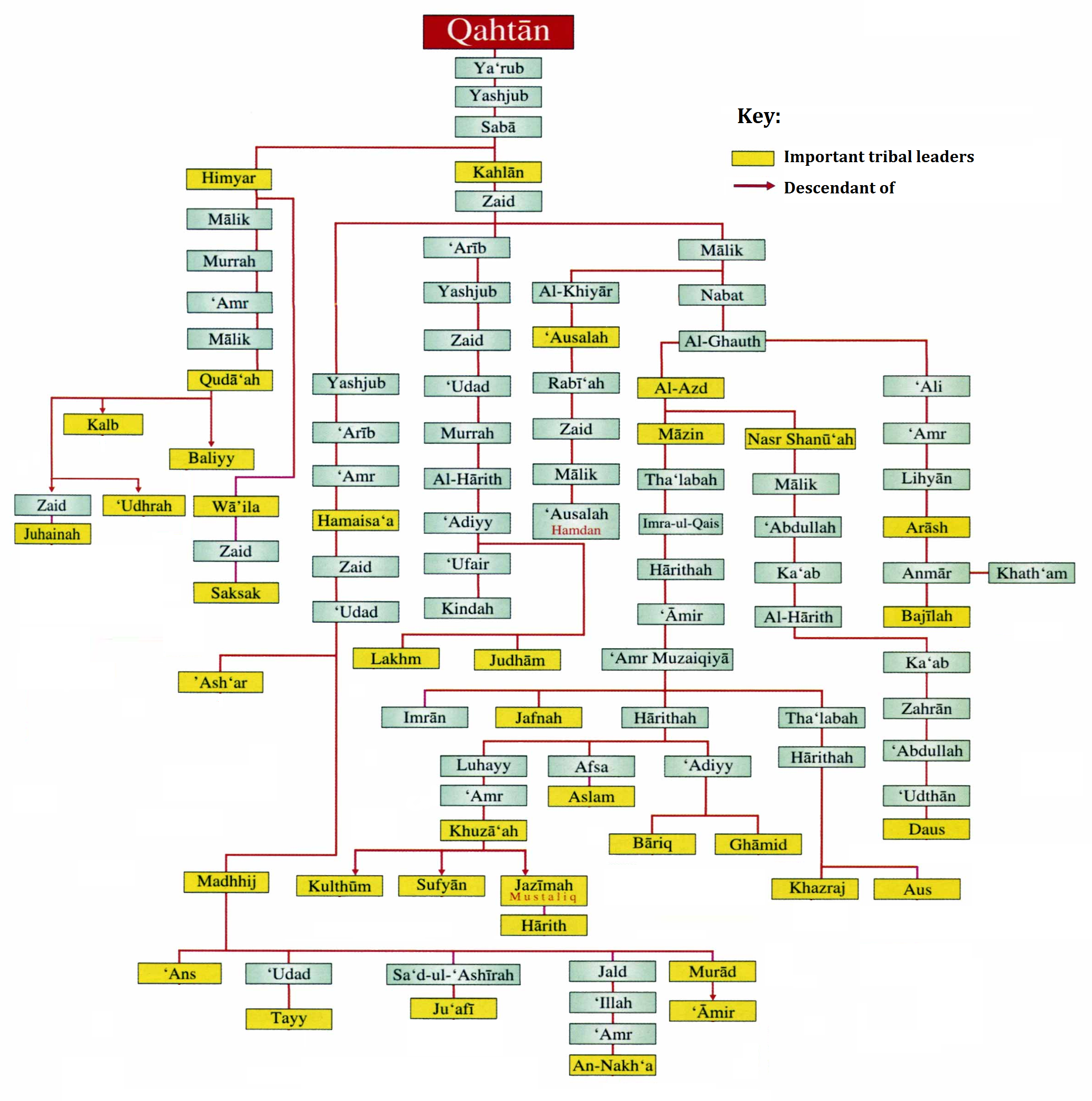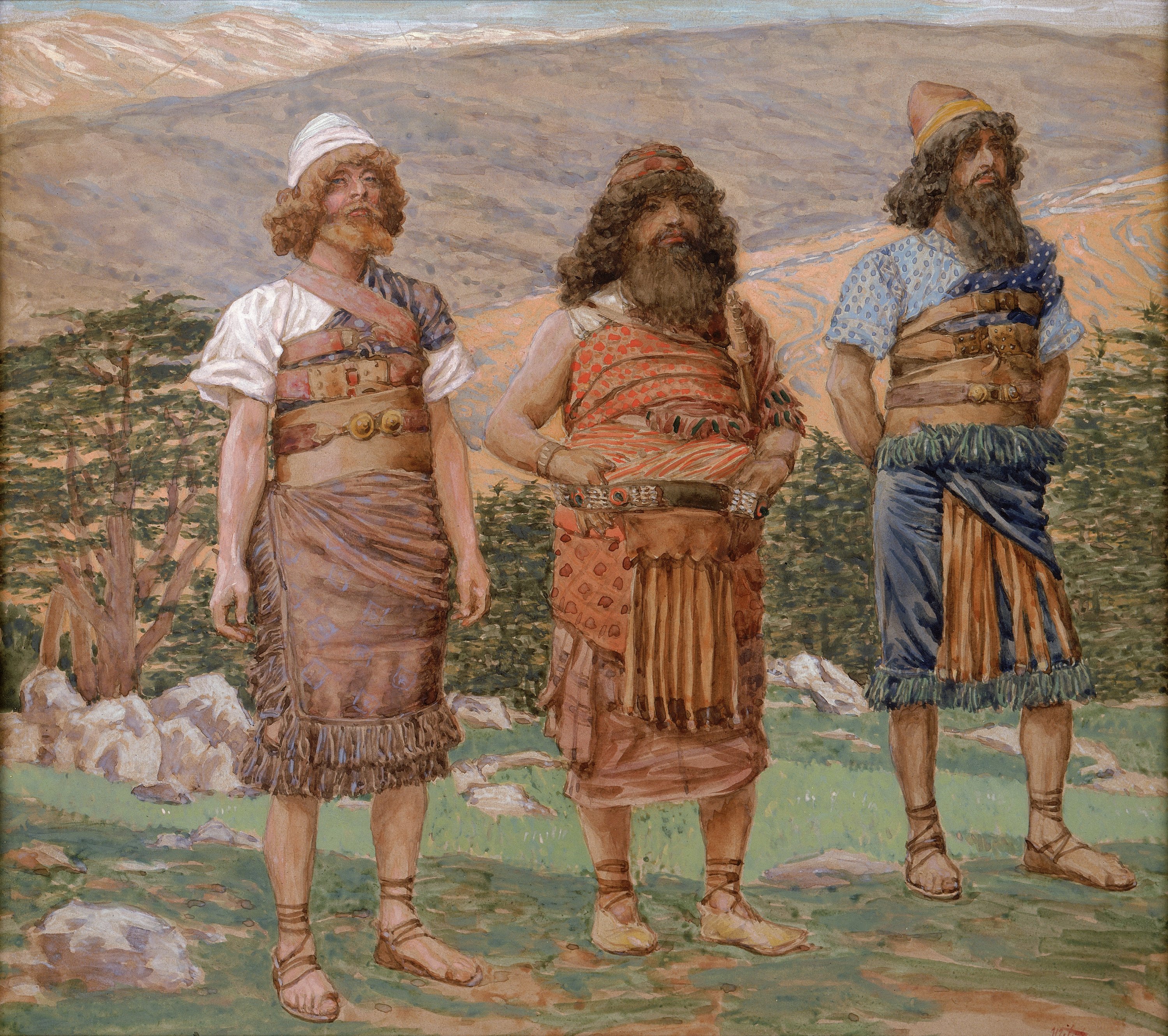|
Joktan
Joktan (also written as Yoktan; ; ar, يقطان, translit=Yaqṭān) was the second of the two sons of Eber (Book of Genesis 10:25; 1 Chronicles 1:19) mentioned in the Hebrew Bible. He descends from Shem, son of Noah. In the Book of Genesis 10:25 it reads: "And unto Eber were born two sons: the name of one was Peleg; for in his days was the earth divided; and his brother's name was Joktan." Joktan's sons in the order provided in , were Almodad, Sheleph, Hazarmaveth, Jerah, Hadoram, Uzal, Diklah, Obal, Abimael, Sheba, Ophir, Havilah, and Jobab.In Pseudo-Philo's account (ca. 70), Joktan was first made prince over the children of Shem, just as Nimrod and Phenech were princes over the children of Ham and Japheth, respectively. In his version, the three princes command all persons to bake bricks for the Tower of Babel; however, twelve, including several of Joktan's own sons, as well as Abraham and Lot, refuse the orders. Joktan smuggles them out of Shinar and into the mountains, ... [...More Info...] [...Related Items...] OR: [Wikipedia] [Google] [Baidu] |
Sheba
Sheba (; he, ''Šəḇāʾ''; ar, سبأ ''Sabaʾ''; Ge'ez: ሳባ ''Saba'') is a kingdom mentioned in the Hebrew Bible ( Old Testament) and the Quran. Sheba features in Jewish, Muslim, and Christian traditions, particularly the Ethiopian Orthodox Tewahedo tradition. It was the home of the biblical "Queen of Sheba", who is left unnamed in the Bible, but receives the names ''Makeda'' in Ethiopian and ''Bilqīs'' in Arabic tradition. According to Josephus it was also the home of the biblical " Princess Tharbis" said to have been the first wife of Moses when he was still a prince of Egypt. There are competing theories of where this kingdom was, with some placing it in either South Arabia or the Horn of Africa. Encyclopedia Britannica posits that the biblical narrative about the kingdom of Sheba was based on the ancient civilization of Saba (Old South Arabian: 𐩪𐩨𐩱 ''S-b-ʾ'') in South Arabia. This view is echoed by Israel Finkelstein and Neil Asher Silberman who w ... [...More Info...] [...Related Items...] OR: [Wikipedia] [Google] [Baidu] |
Qahtanite
The terms Qahtanite and Qahtani ( ar, قَحْطَانِي; Arabic transliteration, transliterated: Qaḥṭānī) refer to Arab people, Arabs who originate from South Arabia. The term "Qahtan" is mentioned in multiple ancient Arabian inscriptions found in Yemen. Arab traditions believe that they are the original Arabs. Traditional Arab genealogy According to Arab tradition, the Qahtanites are from South Arabia, unlike the Adnanites who are from the north of Arabia descended from Ishmael through Adnan. "The 'arabized or arabizing Arabs', on the contrary, are believed to be the descendants of Ishmael through Adnan, but in this case the genealogy does not match the Biblical line exactly. The label 'arabized' is due to the belief that Ishmael spoke Hebrew until he got to Mecca, where he married a Yemeni woman and learnt Arabic. Both genealogical lines go back to Sem, son of Noah, but only Adnanites can claim Abraham as their ascendant, and the lineage of Mohammed, the Seal of Proph ... [...More Info...] [...Related Items...] OR: [Wikipedia] [Google] [Baidu] |
Shem
Shem (; he, שֵׁם ''Šēm''; ar, سَام, Sām) ''Sḗm''; Ge'ez: ሴም, ''Sēm'' was one of the sons of Noah in the book of Genesis and in the book of Chronicles, and the Quran. The children of Shem were Elam, Ashur, Arphaxad, Lud and Aram, in addition to unnamed daughters. Abraham, the patriarch of Jews, Christians, and Muslims, was one of the descendants of Arphaxad. Islamic literature describes Shem as one of the believing sons of Noah. Some sources even identify Shem as a prophet in his own right and that he was the next prophet after his father. Shem is mentioned several times in Genesis 5-11 as well as 1 Chronicles 1:4. In the Bible Genesis 10 Genesis 10:21 refers to relative ages of Shem and his brother Japheth, but with sufficient ambiguity to have yielded different English translations. The verse is translated in the King James Version as: "Unto Shem also, the father of all the children of Eber, the brother of Japheth the elder, even to him wer ... [...More Info...] [...Related Items...] OR: [Wikipedia] [Google] [Baidu] |
Hadoram
Hadoram ( he, ''Hăḏōrām'') is the son of Joktan mentioned in the Book of Genesis of the Hebrew Bible. Noah had three sons: Shem, Ham, and Japheth. One of Shem's sons was Arpachshad. One of Arpachshad's grandsons was Eber. Eber had two sons: Peleg and Joktan. Joktan had many sons including Hadoram as the Book of Genesis (10:26-30) states: :''Yoktan (Joktan) was the father of Almodad, Shelef, Chatzarmaveth, Yerach, Hadoram, Uzal, Diklah, Obhal, Abhimael, Sh'bha, Ophir, Havilah, and Yovav. All these were the sons of Yoktan. Their settlements extended from Meshah toward Sepher, the eastern mountain.' According to Rabbi Aryeh Kaplan's footnotes: "Hadarom: Some interpret this as denoting 'the south.' This was a fortress to the south of (Yemen's) Sana'a (''Kesseth HaSofer''). See 1 Chronicles 18:10; Zechariah 12:11. Hadoram was also the name of the son of the king of Hama , timezone = EET , utc_offset = +2 , timezone_DST ... [...More Info...] [...Related Items...] OR: [Wikipedia] [Google] [Baidu] |
Tower Of Babel
The Tower of Babel ( he, , ''Mīgdal Bāḇel'') narrative in Genesis 11:1–9 is an origin myth meant to explain why the world's peoples speak different languages. According to the story, a united human race speaking a single language and migrating eastward, comes to the land of Shinar (). There they agree to build a city and a tower with its top in the sky. Yahweh, observing their city and tower, confounds their speech so that they can no longer understand each other, and scatters them around the world. Some modern scholars have associated the Tower of Babel with known structures, notably the Etemenanki, a ziggurat dedicated to the Mesopotamian god Marduk in Babylon. A Sumerian story with some similar elements is told in ''Enmerkar and the Lord of Aratta''. Narrative Etymology The phrase "Tower of Babel" does not appear in the Bible; it is always "the city and the tower" () or just "the city" (). The original derivation of the name Babel (also the Hebrew name for B ... [...More Info...] [...Related Items...] OR: [Wikipedia] [Google] [Baidu] |
Almodad
Almodad ( ''’Almōḏāḏ'') was a descendant of Noah and the first named son of Joktan in and . While the Bible has no further history regarding Almodad, this patriarch is considered to be the founder of an Arabian tribe in "Arabia Felix". This is based on the identification of Joktan's other sons, such as Sheba and Havilah, who are both identified as coming from that region. According to ''Easton's Bible Dictionary'' "Almodad" means "immeasurable", however it has also been translated as "not measured", "measure of God", "the beloved," or, "God is beloved", "God is love", and "God is a friend". Many translations and scholarly works use "Elmodad", including Josephus, Douay–Rheims Bible and the Targum Ps.-Jonathan, which elaborates Gen 10:26 and says "begot ''Elmodad'', who measured the earth with cords." See also * List of minor biblical figures, A–K A ''list'' is any set of items in a row. List or lists may also refer to: People * List (surname) Organizations ... [...More Info...] [...Related Items...] OR: [Wikipedia] [Google] [Baidu] |
Uzal
Uzal, in the Hebrew Bible, is a descendant of Joktan (Book of Genesis 10:27 ; 1 Chronicles 1:21), whose settlements are traced in the ancient name of Sanaʽa, the capital city of the Yemen. He was believed to be the founder of an Arabian tribe. Uzal was the sixth of thirteen sons of Joktan. As noted iGenesis 10:26 Joktan became the father of Almodad and Sheleph and Hazarmaveth and Jerah and Hadoram and Uzal and Diklah and Obal and Abimael and Sheba and Ophir and Havilah and Jobab. Occurring in a series of genealogies intended to trace every race known to the ancient Hebrews to one of Noah's children, the Hebrew name Uzal probably referred to the region of ''Azāl'' around modern Sana'a in Yemen. See also * Joktan Joktan (also written as Yoktan; ; ar, يقطان, translit=Yaqṭān) was the second of the two sons of Eber (Book of Genesis 10:25; 1 Chronicles 1:19) mentioned in the Hebrew Bible. He descends from Shem, son of Noah. In the Book of Genesis 10:25 ... References ... [...More Info...] [...Related Items...] OR: [Wikipedia] [Google] [Baidu] |
Havilah
Havilah ( ''Ḥăwīlāh'') refers to both a land and people in several books of the Bible; the one mentioned in , while the other is mentioned in . Biblical mentions In one case, Havilah is associated with the Garden of Eden, that mentioned in the Book of Genesis (2:10-11): In addition to the region described in chapter 2 of Genesis, two individuals named Havilah are listed in the Table of Nations. The Table lists the descendants of Noah, who are considered eponymous ancestors of nations. Besides the name mentioned in , another is mentioned in the Books of Chronicles (). One person is the son of Cush, the son of Ham. The other person is a son of Joktan and descendant of Shem. The name Havilah appears in , where it defines the territory inhabited by the Ishmaelites as being "from Havilah to Shur, opposite Egypt in the direction of Assyria"; and in the Books of Samuel (), which states that king Saul smote the Amalekites who were living there, except for King Agag, whom he took ... [...More Info...] [...Related Items...] OR: [Wikipedia] [Google] [Baidu] |
Hazarmaveth
Hazarmaveth ( hbo, חֲצַרְמָוֶת, italic=no, rtl=yes, ''Ḥăṣarmāweṯ''; ar, حضر موت, italic=no, rtl=yes) is the third of thirteen sons of Joktan, who was a son of Eber, son of Shem in the table of the Sons of Noah in Genesis chapter 10 and 1 Chronicles chapter 1 in the Bible. This Table of Nations lists purported founders of neighboring ethnic groups or nations. Genesis 10:26 ''"...And Joktan hath begotten Almodad, and Sheleph, and Hazarmaveth, and Jerah..."'' Hazarmaveth, also transcribed ''Hazarmaueth'', means "dwelling of death" (Hitchcock's Bible Dictionary) and is composed of two parts in Hebrew: ''hazar/ḥaṣar'' ("dwelling" or "court") and ''maveth/mawet'' ("death"). (There are alternative systems for transliterating Hebrew into Latin letters.) In the Ethiopic version, the name is ''Hasremot''. Scholars of Semitic languages have related the name to the ancient region of Hadhramaut in the modern Southern Arabian nation of Yemen, and indeed, one ... [...More Info...] [...Related Items...] OR: [Wikipedia] [Google] [Baidu] |
Eber
Eber ( he, , ʿĒḇer; grc-x-biblical, Ἔβερ, Éber; ar, عٰابِر, ʿĀbir) is an ancestor of the Ishmaelites and the Israelites according to the "Table of Nations" in the Book of Genesis () and the Books of Chronicles (). Lineage Eber was a great-grandson of Noah's son Shem and the father of Peleg, born when Eber was 34 years old, and of Joktan. He was the son of Shelah, a distant ancestor of Abraham. According to the Hebrew Bible, Eber died at the age of 464. In the Septuagint, the name is written as Heber/Eber (), and his father is called Sala (). His son is called Phaleg/Phalek (), born when Heber was 134 years old, and he had other sons and daughters. Heber lived to an age of 464 years. Name The Aramaic/Hebrew root () is connected with crossing over and the beyond. Considering that other names for descendants of Shem also stand for places, Eber can also be considered the name of an area, perhaps near Assyria. A number of mediaeval scholars such as Mich ... [...More Info...] [...Related Items...] OR: [Wikipedia] [Google] [Baidu] |
Ophir
Ophir (; ) is a port or region mentioned in the Bible, famous for its wealth. King Solomon received a shipment from Ophir every three years (1 Kings 10:22) which consisted of gold, silver, sandalwood, pearls, ivory, apes, and peacocks. Biblical references Ophir in Genesis 10 (the Table of Nations) is said to be the name of one of the sons of Joktan. The Books of Kings and Chronicles tell of a joint expedition to Ophir by King Solomon and the Tyrian king Hiram I from Ezion-Geber, a port on the Red Sea, that brought back large amounts of gold, precious stones and ' algum wood' and of a later failed expedition by king Jehoshaphat of Judah. The famous 'gold of Ophir' is referenced in several other books of the Hebrew Bible. In the Septuagint, other variants of the name are mentioned: ''Ōpheír'', ''Sōphír'', ''Sōpheír'' and ''Souphír''. The New Testament apocrypha book ''Cave of Treasures'' contains a passage: "And the children of Ophir, that is, Send, appointed to be the ... [...More Info...] [...Related Items...] OR: [Wikipedia] [Google] [Baidu] |
Nimrod (king)
Nimrod (; ; arc, ܢܡܪܘܕ; ar, نُمْرُود, Numrūd) is a biblical figure mentioned in the Book of Genesis and Books of Chronicles. The son of Cush and therefore a great-grandson of Noah, Nimrod was described as a king in the land of Shinar (Mesopotamia). The Bible states that he was "a mighty hunter before the Lord nd... began to be mighty in the earth". Later extra-biblical traditions identified Nimrod as the ruler who commissioned the construction of the Tower of Babel, which led to his reputation as a king who was rebellious against God. Nimrod has not been attested in any historic, non-biblical registers, records or king lists, including those of Mesopotamia itself. Historians have failed to match Nimrod with any historically attested figure. Several ruins of the Middle East have been named after him. Biblical account The first biblical mention of Nimrod is in the Table of Nations. He is described as the son of Cush, grandson of Ham, and great-grandson of ... [...More Info...] [...Related Items...] OR: [Wikipedia] [Google] [Baidu] |






.jpg)